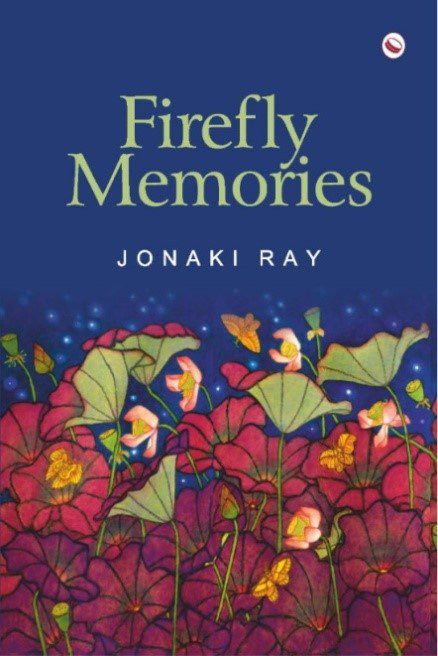
Title: Firefly Memories
Author: Jonaki Ray
Genre: Poetry
Language: English
Publisher: Copper Coin Publishing
Year: 2023
Pages: 83
Price: Rs. 399/-
ISBN No.: 978- 81- 955826-3-1
We live in a world where the word ‘identity’ has lost all meaning; yet we keep up our endless pursuit of fragments in which we hope to see our names and reflections. Some choose not to address these gaps, some acknowledge it but warily, and others give voice to the nuances that make up a community. The literary milieu at present finds itself populated with voices of the latter kind that often belong to those scattered far away from their familiar cultural centres, birthing realities that are too complex to be showcased on Venn diagrams. A preferred mode of expression for them has thus been poetry which mirrors their intricate truths through a medium as complex as their realities. Jonaki Ray’s Firefly Memories drives this truth home through stanzas that express humble nostalgia for her homeland while still remaining conscious of the identities she has acquired over time. Her work makes one realize that these hyphenations put people in a socio-cultural limbo as they struggle to integrate the contradictions in their own personal histories.
The very title of Ray’s book gives the reader a glimpse into the way in which she perceives memories. Like fireflies, these memories are illuminated even when they bring waves of woe; they are at once within her reach and far away. They are arbitrary in the way they emerge and speak to each other, and yet carry meanings unique to one’s experience. Many poems in the volume deal with the relationship a person shares with their memories. ‘The Secret to a Good Biryani’ ends with the realisation that “something is always missing” (6). Ray seems to be relying on her memories while pondering if they are ever truly enough.
Ray is subtle in her articulation but her voice still reverberates with a quiet power. An exemplary poem would be “Tomorrow Is a Many-Eyed Goddess” where the preoccupations of an immigrant are laid bare. The pathos here is restrained as in most of her poems but it manages to speak to readers whose stories might not be the same as her own:
“home is not this broken shanty.
Home is not this cold, cold place that we have come to
for the few hazaar taka notes in our hands.” (22)
She ends her rumination with a poignant question:
“For look, here, they give us blue gloves to protect our hands.
The only thing is, no one tells me:
Who will protect me today?” (22)
This train of thought continues in “Dreamland” which is a clever exposition of the many ironies that abound the life of immigrants. From the humorous White Street that houses all non-white students to the more sinister colleagues “who denounce/foreigners who take away ‘our’ jobs”, this poem is a mood board that exhibits the crudities accompanying a displaced existence. “(Be)longing” is a similar poem that touches upon the themes of shifting identity visible through contrasting imagery and new cultural vocabularies:
“Windchill, flurries, black ice, blizzards, snow angels, down jackets
immigrated into my vocabulary
replacing
green mangoes, sherbets, thunderstorms, power cuts, frangipani
Gold and auburn leaves
negated
the wet earth engorging with the first rain smell
People-less space all around- all clean all bright all surplus.” (4)
The book is also a testament to the multitude of experiences that come with being part of the diaspora and the vantage point it affords. Being a part of multiple cultures allows one to truly assess the best and the worst of civilisation. Despite living far away from home, Ray is vigilant towards the horrors of her homeland which she expresses in poems like “Burn” and “Housecleaning”. The predicaments of her sex thus find a place in her pages and Ray does a masterful job in reminding her readers of the perpetual struggles of being a woman. The former tells the story of the acid attack on Reshma Qureshi. Ray’s choice of writing about women’s experiences (both real and imagined) in first person allows them the voice they lack in real world. “Charity Home, Chandernagore” is another such piece:
“I could have told them about my parcelling
between different shelters.
I could have told the lady that the city is full
of old men with their skin like leather handbags.
And that old men like me―”(24)
A noticeable sub-theme in Ray’s poems happens to be the idea of food as a vehicle of nostalgia. This metaphor may not be unique to Ray as food has always been a popular choice for voicing pride and acknowledgement of one’s roots, especially in South-Asian writings. Ray however, manages to give it a fresh take by refraining from mere reminiscing. In “The Secret to a Good Biryani”, she juxtaposes the many steps of cooking biryani with the rites of passage that every quintessential immigrant goes through. The memories go back and forth between her present and the past, signalling that time is anything but linear. The pot of biryani holds layers that speak to both aspects of her reality. While “Orange and gold autumn nights resemble the puffed layers/of saffron-flavoured rice” (5), “temples that you ignored back home” and “the cricket teams/that you ignored earlier” (5) also come alive at the same time. “Mashi’s Food Symphony” uses food to show the innocent entanglements within human relationships.
Ray is a skilled poet with a penchant for voicing disturbing truths with grace. Her poem “Talk about Trees” is a suitable example of jagged emotions that get softened when put into words:
“Don’t talk about her eyes
that even half-shut in death
remain hard to look away from” (48)
She implores her readers to embrace innocence and beauty while it lasts:
“Talk about trees because they, like children,
still believe in the sky. Still grow. Still love.
Talk about trees because some day
we will talk about the unspeakable.” (48)
Ray’s Firefly Memories is an book with disparate themes that reflect her range of interests and speak to each other harmoniously. This of course excludes the deliberate and rather telling dissonance between the title of many of her poems and their themes which in my opinion only serves to enhance the overall feeling of alienation from one’s roots and highlights the cryptic nature of reality. From poems that combine scientific ideas with personal crises (read “Photosynthesis”) to observations made upon pondering over artefacts from around the world (“Pieta”, “Reverse Astrology”, “Verdigris”), the book truthfully erases the boundaries of identity and experience. What the readers can take away from Ray’s poems is that we are and live in a cornucopia that offers both beauty and misery in plenty. The only respite amidst these conflicting divides is the humanity we share in common. Poets like Ray are thus relevant to our times for voicing their truths with this awareness.
■■
Adyasha Mohapatra is a Research Scholar in the Department of English, University of Delhi. Prior to pursuing her research, she spent three years teaching English literature professionally. She is passionate about poetry, visual arts and cinema which also constitute her academic interests. She likes to live off the social media grid and relies on a daily dose of tea to quell the anxieties of urban life.

Subscribe to our newsletter To Recieve Updates
Join our newsletter to receive updates